HSC 4504
University Of South Florida
All 7 results
Sort by
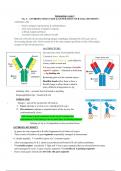
-
Introduction immunology: T & B cell development ( step by step), antibody structure, antigen processing, Ig classes
- Summary • 10 pages • 2024
-
- $7.80
- + learn more
Immunology notes on: ANTIBODY STRUCTURE & GENERATION OF B-CELL DIVERSITY, IG CLASSES, ANTIGEN RECOGNITION BY T LYMPHOCYTES, GENETICS, ANTIGEN PROCESSING & PRESENTATION, B CELL DEVELOPMENT, T LYMPHOCYTES DEVELOPMENT. Includes figures with T & B cells development in chronological order, step by step Summary of contents for exam 2 for the USF course HSC 4505 (Introduction to public health immunology). Chapters 4-7
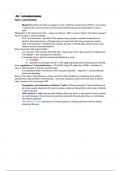
-
Introduction to Immunology : T & B cells, cytokines, antibodies, infections at mucosal surfaces, immunological memory, & vaccines
- Summary • 11 pages • 2024
-
- $7.80
- + learn more
Immunology notes on: T cell mediated immunity, T cell maturation, cytokines, effector T cells, B cell mediated immunity, antibodies, infections at mucosal surfaces, immunological memory, vaccines Summary of contents for exam 3 for the USF course HSC 4505 (Introduction to public health immunology). Chapters 8 to 11.
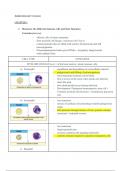
-
Introduction to Immunology : Immune cell types, lymphatic tissues, coagulation, antimicrobial peptides, complement pathways
- Summary • 12 pages • 2024
-
- $7.80
- + learn more
Immunology notes on: Immune cell types, lymphatic tissues, coagulation, antimicrobial peptides, complement pathways, etc. Summary of contents for exam 1 for the USF course HSC 4505 (Introduction to public health immunology).
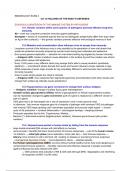
-
Introduction to immunology: vasion of the immune system by pathogens, immunodeficiencies diseases, AIDs, Allergies & parasitic immune response, organ transplantation, autoimmunity, cancer & immunotherapy.
- Summary • 18 pages • 2024
-
- $7.80
- + learn more
Immunology notes on: evasion of the immune system by pathogens, immunodeficiencies diseases, AIDs, Allergies & parasitic immune response, organ transplantation, autoimmunity, cancer & immunotherapy. Summary of contents for exam 4 for the USF course HSC 4505 (Introduction to public health immunology).
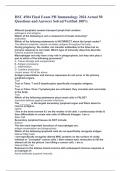
-
HSC 4504 Final Exam PH Immunology 2024 Actual 50 Questions and Answers Solved/Verified 100%
- Exam (elaborations) • 7 pages • 2024
-
- $16.49
- + learn more
HSC 4504 Final Exam PH Immunology 2024 Actual 50 Questions and Answers Solved/Verified 100% Afferent lymphatic vessels transport lymph that contains pathogens and antigens Which of the following is not a component of innate immunity? antibodies Which of the following statements is INCORRECT about the lymph nodes? The afferent lymphatic vessels circulates antigens throughout the body. During pregnancy, the mother can transfer antibodies to the fetus but an immune response is not made. ...

-
HSC 4504 Final Exam PH Immunology 2024 Actual 50 Questions and Answers Solved/Verified 100%
- Exam (elaborations) • 19 pages • 2024
- Available in package deal
-
- $15.99
- + learn more
HSC 4504 Final Exam PH Immunology 2024 Actual 50 Questions and Answers Solved/Verified 100% Which of the following is TRUE about innate immunity? Innate immunity improves with successive exposures to the same pathogen or antigen. Innate immunity employs B and T lymphocytes to generate a response. Innate immunity employs phagocytes and natural killer cells to generate a response. Innate immunity is specific for any given pathogen or antigen. Innate immunity has a stronger second...

That summary you just bought made someone very happy. Also get paid weekly? Sell your study resources on Stuvia! Discover all about earning on Stuvia


